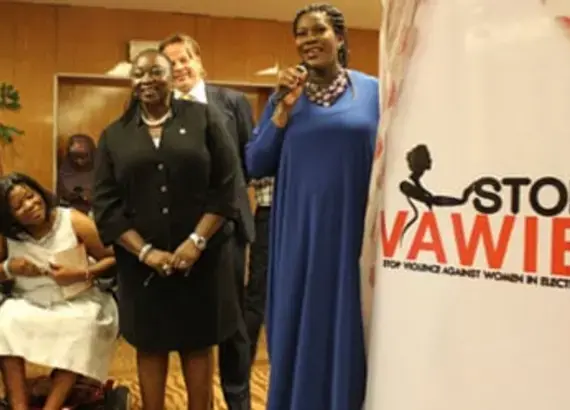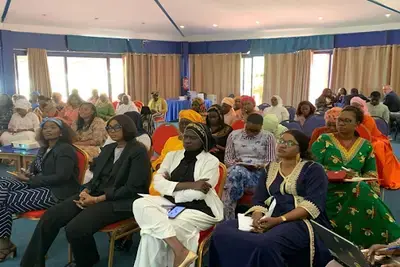
Success Story
NDI Launches Campaign in Nigeria to Stop Violence Against Women in Elections
Violence against women seized the world’s attention last year when nearly 300 schoolgirls were kidnapped by Boko Haram, a terrorist group that has been a constant source of insecurity in Nigeria’s northeast. But violence against women -- in Nigeria and around the world -- takes many forms, and much of it is under-reported.
In Nigeria, violence often spikes around elections because it is used as a tool for political intimidation, but little is known about how much of and in what ways this violence is directed at women. Research suggests that violence against women in elections (VAW-E) is much more widespread than existing reports indicate. During the 2011 national elections, for example, there were reports that female Nigerian National Youth Service Corps volunteers experienced sexual harassment at polling units across the country, but there was no systematic effort to capture the true scope of the violence and address the issue. A new campaign by NDI and its partners in Nigeria seeks to shine a new light on this issue.
On Sept. 1 in Abuja, Nigeria, NDI and its civic education partner, International Federation of Women Lawyers (FIDA) launched the “Stop Violence Against Women in Elections” (Stop VAWIE) campaign. The campaign will document and report data on incidents of violence against women, engage with election officials, security services, women’s groups and others to mitigate violence and organize civic education around preventing violence against women in elections. The Stop VAWIE campaign is part of Votes Without Violence, NDI’s global campaign to address gender-based violence in elections.
“Women are targeted for violence during elections specifically because they are women and to stop them from exercising their democratic rights,” said Jasper Veen, NDI’s resident director in Nigeria, at the event. “Nigerians are demanding peaceful elections for everyone.”
Over the last several years, nonpartisan citizen election observation organizations around the world have made great strides in monitoring and mitigating election-related violence. However, VAW-E has not been distinguished from wider studies of electoral violence, making it impossible to properly address the problem and understand its impacts on women’s political participation, the integrity of elections and the democratic process.
At yesterday’s launch event, NDI and FIDA convened Nigerian journalists as well as representatives of the Independent National Electoral Commission, the Nigeria Police Force and the United States Agency for International Development (USAID) to unveil the initiative.
Nigerian actor, director and humanitarian Stephanie Okereke Linus pledged to be the celebrity ambassador for the Stop VAWIE campaign. Linus called for the use of “all available platforms” to put an end to violence against women: “If we are going to see an end to violence against women, first and foremost we are going to have to place a demand and insist on it.” She credited the Stop VAWIE campaign with beginning the “process of emancipating this injustice against the female gender.”
NDI has collaborated with other Nigerian celebrities in the past. In the lead up to the March 2015 elections, NDI and musician 2face Idibia launched the Vote Not Fight: Election No Be War campaign to educate young people about non-violence and encourage peaceful youth participation in the March 2015 elections.
With off-cycle gubernatorial elections approaching in Kogi and Bayelsa states on Nov. 21 and Dec. 5, respectively, NDI and its partners, the Transition Monitoring Group (TMG) and FIDA, will carry out activities to document incidents of VAW-E before the election, on election day and in the post-election period.
NDI will work with TMG and FIDA throughout the election process to collect data on incidents of gender-based violence both through a systematic pre-election observation methodology that it used during the March 2015 elections and a hotline that will collect reports of VAW-E from citizens. NDI will enable the collection, storage and analysis of the data through a web-based platform that will visualize the reports over time.
FIDA will then harness this information to influence key government and security officials to design policies that address and mitigate VAW-E. FIDA also plans to implement a broader campaign to educate voters on women’s political participation and the impact of VAW-E and work with women’s organizations to ensure women have access to resources that they need in the areas where violence was reported.
“If a democracy is to deliver on its promise, it must be able to count on the contributions of all its citizens,” said Veen at the launch event. “This cannot happen if women and girls are prevented, whether by law or tradition, from full participation in the political life of Nigeria.”
The program is funded by USAID.
Posted on September 2, 2015



